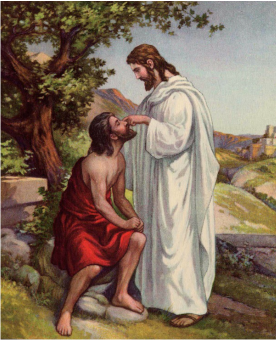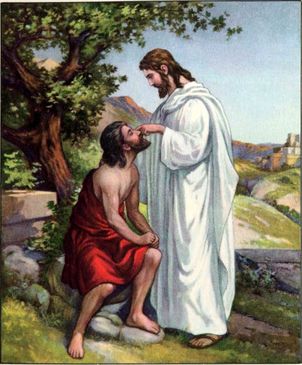First Point.—The characters of spiritual blindness.
As Jesus approached Jericho He met a blind man seated on the wayside and asking alms To understand this species of blindness which falls upon sinners you have only to look about you. Have you not been sometimes terrified at the insensibility of certain men for their eternal interests? Religion, which has converted the world by the sublimity of its teachings, is for them only a mass of gross reveries. Morality, which has brought on earth the reign of virtue, is in their eyes only fanaticism or superstition. The most heroic examples of virtue, instead of exciting in them a sentiment of admiration, only provoke pity and contempt. The most touching exhortations awaken their curiosity without appealing to their mind or heart They commit crime after crime, violate the most sacred engagements, revel in blasphemy, and remain perfectly tranquil. Duties which every reasonable being owes to his Creator are put aside; laws of the Church, to which every Christian should be submissive, are trampled underfoot; they publish scandals and what is baneful to religion, and still believe themselves irreproachable, and ask what evil have they done. They live without remorse, and die undisturbed and fall into the avenging hands of God, whom they have despised. Can
there be a state more fearful than this in the eyes of reason and in the eyes of faith ?
The blind man of Jericho, to sustain his sad existence, asked of those who passed by an alms, which was often refused him. The Gospel says he was begging - mendicans. This is the second character of spiritual blindness. In the bosom of the Catholic Church, the depository of eternal truths, in the midst of that light with which Christianity has inundated the world, in the midst of so many means to find repose of mind and peace of heart, they who are stricken become mendicants. They ask of reason light which they have not; they ask of human wisdom the truth which she cannot give; they ask of pleasure joys of which she is ignorant. In their need of joys, their famished souls extend their hands to the passions and to pleasures. Each passion and each pleasure deposits an alms, but it is only an alms; it may suffice to solace, or rather to distract, the heart for a moment, but it is powerless to satisfy the need which devours it; it remains hungry and is always begging—mendicans.
The blind man of Jericho was seated on the wayside. This is the last trait which characterizes those who are spiritually blind. They are near the way which conducts to truth, to virtue, to life, and still they do not wish to enter there. Reflect on this expression, which contains a truth at once profound and true—"He was sitting. " It is not said that he was standing and ready to walk, but he was seated; he remained there in stupid repose, unmindful of what was passing around him. This expression is sufficient to make us understand that he was satisfied in his unfortunate carelessness, preferring an unworthy repose to generous effort which would place him in the right way. This is only a too true picture of those sinners of whom we are speaking. They are outside the way which conducts to salvation, and are not striving to re-enter it. To do this they should be most active, and instructed in their duties, and resist their passions, or at least make some efforts; but they love their ease beyond anything else, and nothing can determine them to abandon their tranquillity. And thus the privation of all truth, the want of all good works, and complete carelessness of salvation are the characters of this terrible malady which is called spiritual blindness. We shall now see how it may be healed.
Second Point.—For a complete cure of spiritual blindness, the first thing which must be done by him who is afflicted is to be instructed in his religion and to make known his uncertainties and doubts to those who can resolve them. At the sound of the voices which were about him and the noise made by the multitude which had followed Jesus, the blind man informed himself of air that passed. He asked "what it was." Well, Christianity passes near us, is about us on every side, with its laws, its dogmas, its blessings, its threats, and its promises. We should inform ourselves what it is, we should study the claims and proofs on which it rests, the duties it imposes, and labor earnestly to merit the blessings which it promises. We should avoid the evils with which it threatens us, since eternity is well worth the trouble which all this requires. Indifference in this matter is wholly unjustifiable.
The second thing to do in a case of spiritual blindness is to pray. Faith is a gift of God, and this gift we all receive in Baptism. This explains the facility with which we believe the highest mysteries, even in tenderest infancy, and as long as we preserve purity of heart. But when, by bad books, sinful conversations, voluntary doubts, and by indulgence of our passions we have driven the spirit of faith from our intelligence, we cannot again recall it, except by most fervent prayer. But you say, "I wish I could have faith!" Have you prayed to obtain it? Reflect on the prayer of the blind man imploring his healing, and strive to imitate his fervor. "Have pity on me, Lord, Son of David!" See how he feels his malady, how he desires a return of health. And what perseverance in his prayer! They who are near to him endeavor to impose silence on him, but he seems unmindful of them and is not at all influenced by their words; he even cries louder still. From the moment you wish to belong to God the world will blame you. Prejudices, habits, passions shall strive to turn you away from prayer. However, still remain faithful to it, since your healing and your salvation will be due to your perseverance.
O my God, I address Thee with the prayer which the poor blind man employed—" Son of David, have pity on me!" Have pity, because of the sad state to which sin has reduced me. Make known to me my misfortune in its fullest extent; I do not know it sufficiently. Place in my heart a lively and profound sorrow for my sins, which should be there and which I do not find there. Inspire me with those strong, courageous, and efficacious resolutions which I strive in vain to form. Break these criminal attachments and these vicious habits which I have not the strength to break. Reform my sad inclinations which drag me down in spite of my feeble efforts. Have pity on me, Lord ! Have pity on my weakness!
Source: Short Instructions on the Feasts of the Year, Imprimatur 1897




 RSS Feed
RSS Feed